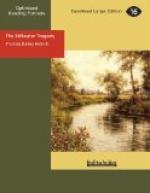At supper Mr. Shackford refrained from examining Richard on his day’s employment, for which reserve, or indifference, the boy was grateful. When the silent meal was over the old man went to his papers, and Richard withdrew to his room in the gable. He had neglected to provide himself with a candle. Howwever, there was nothing to read, for in destroying Robinson Crusoe he had destroyed his entire library; so he sat and brooded in the moonlight, casting a look of disgust now and then at the mutilated volume on the hearth. That lying romance! It had been, indirectly, the cause of all his woe, filling his boyish brain with visions of picturesque adventure, and sending him off to sea, where he had lost four precious years of his life.
“If I had stuck to my studies,” reflected Richard while undressing, “I might have made something of myself. He’s a great friend, Robinson Crusoe.”
Richard fell asleep with as much bitterness in his bosom against DeFoe’s ingenious hero as if Robinson had been a living person instead of a living fiction, and out of this animosity grew a dream so fantastic and comical that Richard awoke himself with a bewildered laugh just as the sunrise reddened the panes of the chamber window. In this dream somebody came to Richard and asked him if he had heard of that dreadful thing about young Crusoe.
“No, confound him!” said Richard, “what is it?”
“It has been ascertained,” said somebody, who seemed to Richard at once an intimate friend and an utter stranger,—“it has been ascertained beyond a doubt that the man Friday was not a man Friday at all, but a light-minded young princess from one of the neighboring islands who had fallen in love with Robinson. Her real name was Saturday.”
“Why, that’s scandalous!” cried Richard with heat. “Think of the admiration and sympathy the world has been lavishing on this precious pair; Robinson Crusoe and his girl Saturday! That puts a different face on it.”
“Another great moral character exploded,” murmured the shadowy shape, mixing itself up with the motes of a sunbeam and drifting out through the window. Then Richard fell to laughing in his sleep, and so awoke. He was still confused with the dream as he sat on the edge of his bed, pulling himself together in the broad daylight.
“Well,” he muttered at length, “I shouldn’t wonder! There’s nothing too bad to be believed of that man.”
VII
Richard made an early start that morning in search of employment, and duplicated the failure of the previous day. Nobody wanted him. If nobody wanted him in the village where he was born and bred, a village of counting-rooms and workshops, was any other place likely to need him? He had only one hope, if it could be called a hope; at any rate, he had treated it tenderly as such and kept it for the last. He would apply to Rowland Slocum. Long ago, when Richard was an urchin making pot-hooks in the lane, the man used occasionally to pat him on the head and give him pennies. This was not a foundation on which to rear a very lofty castle; but this was all he had.




